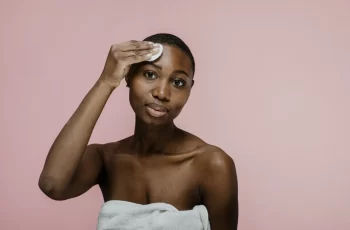
Can I use Vitamin C before Retinol?
There is a lot of uncertainty about how to use these two powerful ingredients and if you should. This is often the result of outdated research on retinol and vitamin C alone or in combination. The truth is, vitamin C and retinol work perfectly together to give you a healthy, radiant complexion. Warning: Make sure you use these powerful skincare heroes correctly to fight signs of aging, uneven skin tone, and dull complexion (to name a few) and avoid unnecessary skin irritation and breakouts.
With that in mind, the question for today’s blog post is: Can I use Vitamin C before Retinol? If you want to learn more about using Vitamin C and Retinol together, check out our dedicated blog post: Can You Use Vitamin C with Retinol?
Can I Use Retinol After Vitamin C?
Yes, you can. It is completely safe to use retinol after Vitamin C if used correctly. What I mean by this is to allow enough time between applications to allow the pH of the skin to rebalance and prepare for the retinol. It’s important to consider your skin’s pH level when using skincare, as using the wrong products can cause an imbalance that can lead to irritation and allergic reactions. The skin naturally requires a lower pH level to be at its healthiest, typically between 0 and 3.5. This means that the skin can absorb Vitamin C effectively, but it’s too low for Retinol. For this reason, it’s generally recommended not to layer these powerful ingredients directly on top of each other. This prevents the pH levels of Vitamin C and Retinol from affecting each other and not achieving the desired results for your complexion.
Can Vitamin C Serum and Retinol be used together?
No, it’s best not to use Vitamin C and Retinol together, because as I mentioned before, the imbalance caused by different pH levels can affect the effectiveness of these ingredients. But that doesn’t mean you can’t use them in the same routine. Here are some of the key benefits you can expect when you use this anti-aging, skin-rejuvenating duo together.
A more even skin tone, signs of dark spots, hyperpigmentation, and acne scars.
Creates a more radiant all-over complexion
Reduces skin inflammation
Smooths skin texture for a more even-toned complexion
Fights acne and other breakouts
Provides a firmer, tightened effect to skin
Reduces the appearance of premature aging, such as fine lines and wrinkles
No wonder so many of you use these ingredients in your daily routine. Both are designed to fight signs of aging, whether natural or caused by damage from exposure to free radicals. Retinol works on the lower layers of the skin to boost collagen production, supporting the skin and making it firm and soft. Vitamin C is rich in antioxidants that strengthen the skin barrier and block harmful free radicals.
Should I apply anything after retinol?
Yes, absolutely! Many skin care experts believe that after using a retinol product, it’s best to use another product that contains a hydrating ingredient like hyaluronic acid. This helps combat the common drying side effects of using retinol in your skincare routine, especially if it’s a new ingredient in your routine.
Retinol needs to be used at night because exposure to the sun’s UVA and UVB rays causes retinol to lose its effectiveness, rendering it pointless. In the morning, your retinol product will work while you sleep, leaving you with no issues during the day. Don’t forget to apply an SPF 30 or higher sunscreen after your morning skincare routine to ensure your face is protected from skin damage caused by UV rays and other environmental aggressors.
Can I use Vitamin C at night?
Yes, you can, but it really depends on you and your daily routine. Personally, I love the glow I get after using a Vitamin C serum and think it’s a waste of an evening skincare routine. Because it’s packed with antioxidants that fight free radical damage, applying Vitamin C before applying sunscreen can help strengthen your skin barrier so it can function optimally throughout the day.
If you want to apply Vitamin C at night, you can. Many believe that the antioxidant properties of Vitamin C can reverse signs of damage caused throughout the day.
Why Vitamin C and Retinol Should Not Be Used Together?
It’s best to avoid using Vitamin C and Retinol together. This means mixing product formulas, which only causes the individual ingredients to compete with each other and become useless. As I mentioned before, you can still use both ingredients in your daily routine, but there are a few skin care rules you should follow. To ensure you’re taking full advantage of each powerful function.
Remember to start slow
It’s important to slowly introduce new skincare ingredients into your routine, especially when they’re as effective as retinol. By building your skin’s tolerance and watching how it reacts, you’ll avoid irritation and establish an effective and soothing routine. Over time, your complexion will benefit without damaging or disturbing the skin’s surface.
Apply SPF daily
This is probably one of the most important steps in your routine that you should never skip. Even on cloudy days, UVA rays are always present. This is the radiation that causes skin aging and can pass through glass and water. Applying SPF daily will protect the skin’s surface and fight free radical damage.
Combine it with hydration
Both Vitamin C and Retinol are known to be somewhat drying to the complexion, especially when used together. By adding hydrating ingredients like Hyaluronic Acid, you can keep the skin’s surface hydrated and soft.
Hopefully, you now have a better idea of what you can expect when using Vitamin C before Retinol and when combining the two. Don’t forget to follow me on Instagram and reach out to me via direct message if you have any questions.


